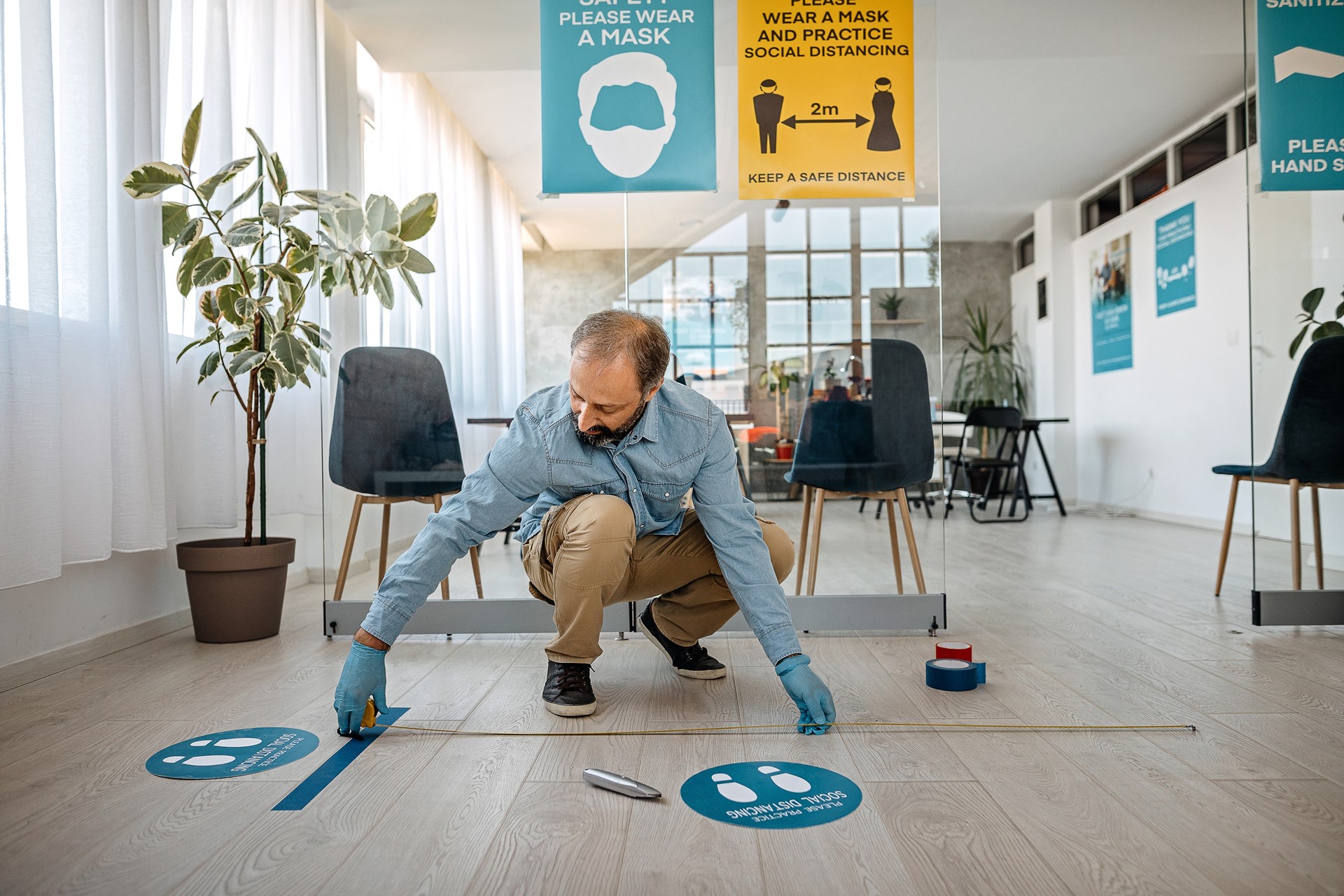Non-remote Businesses To Spend £23bn On COVID Regulation This Year
Wednesday 9th June 2021

- On-site businesses will spend an average of £4,850 each on ensuring their workplace is COVID secure this year
- Meanwhile, two-thirds (68%) of businesses working from home will spend nothing on COVID regulation this year, with 21% spending less than £1,000
- Professional cleaning and reconfiguring workstations, kitchen and communal areas amongst top of the list of measures being taken
While there may be a glimmer of light at the end of the COVID tunnel for businesses in the UK, with vaccinations on the increase and signs of an economic bounce back, the financial cost of the pandemic for small businesses continues to linger, according to new research by Hitachi Capital Business Finance.
Asking a sample of around 1,500 small business owners about the measures they were taking to ensure their workplace premises were COVID-secure – from office risk assessments, signs, and sanitising products to air filtering systems – the results showed that location-based businesses expected to pay on average £4,850 each this year, equating to a total of just under £23bn being spent on COVID measures.
Fixed premises businesses (41% of small businesses) and outdoor or on-site businesses (17%) estimated having to spend similar amounts this year to ensure they were COVID secure (£5,443 and £5,446 respectively). Meanwhile, businesses planning to work in a hybrid set up post restrictions (20% of small businesses) anticipated spending roughly two-thirds of these other groups (£3,660).
By contrast, for those expecting to work remotely post restrictions (around 21% of all small businesses), a majority of two-thirds (68%) expected to pay nothing at all, with 21% spending less than £1,000.
The results showed that sectors that were most likely to be working on site were also spending the most on COVID regulations. In the hospitality and leisure sector, where 63% of businesses will work full time from the same workplace, the average spend was £5,420. Similarly in manufacturing, where 57% work on site, the average spend was £5,260 on COVID regulations. By contrast, IT small businesses, where 37% of businesses will solely work from home by the end of this year, expected to spend just £3,420 on average.
Specific measures being taken
Asking about the specific measures workplace based bosses were taking to ensure their premises were COVID secure, professional cleaning (52%), facemasks and sanitising products (51%) and signage (36%) were the most commonly cited answers.
Among the more expensive options, 31% said they had to reconfigure workstations to avoid people sitting face-to-face, 22% would rearrange their workplace to allow for more space in communal and kitchen areas, while 20% would alter their air condition system to ensure it had the right filters.
Around 30% were regularly conducting a thorough risk assessment, while 12% had arranged for a PHE/HSE visit of their premises.
Joanna Morris Head of Insight at Hitachi Capital Business Finance: “While the true cost of the pandemic for small businesses will not be known for some time, initial views suggest the hidden costs will add up. This is a good example of how the challenges associated with the global pandemic can vary hugely from one small business to another. While many non-remote businesses have faced, and continue to face, additional costs to remain compliant, our research has also shown these groups have benefitted in other ways – from the quality of the work produced to stronger team spirit.
“For others where working remotely has been possible largely thanks to technology, we have reached the point where 2 in 5 (41%) small businesses are now considering working completely remotely or in a hybrid set up – something unimaginable at the start of last year. How this evolves will depend on a huge range of internal and external factors. The task for bosses is to ensure their business manages the factors within their control, maintaining and improving their technological agility and minimising the chances of being left behind.”
Measures being taken to ensure workplace is COVID secure for staff
Bosses that either already are working, or will expect to be by the end of this year, in an office/factory/on site workplace
|
Professional cleaning |
52% |
|
Face masks/visors and sanitising products |
51% |
|
Social distancing policy |
48% |
|
Signs and posters for staff |
36% |
|
Workstations re-configured to stop people sitting face-to-face |
31% |
|
Conduct thorough risk assessment |
30% |
|
Temperature checks on arrival |
30% |
|
Open window policy |
29% |
|
Staggered shifts/working hours to avoid overcrowding |
24% |
|
Staff advice on safe travel to and from work (car sharing and public transport) |
23% |
|
More/designated space in kitchen and communal areas |
22% |
|
HR review of people with underlying health conditions |
22% |
|
Air conditioning filtering systems |
20% |
|
Staff self-certification |
17% |
|
Arrange PHE/HSE visit of premises |
12% |
|
None of the above |
3% |
|
Other |
1% |
|
I don't need to do any of this as restrictions end on 21 June |
1% |
|
All of the above |
0% |
